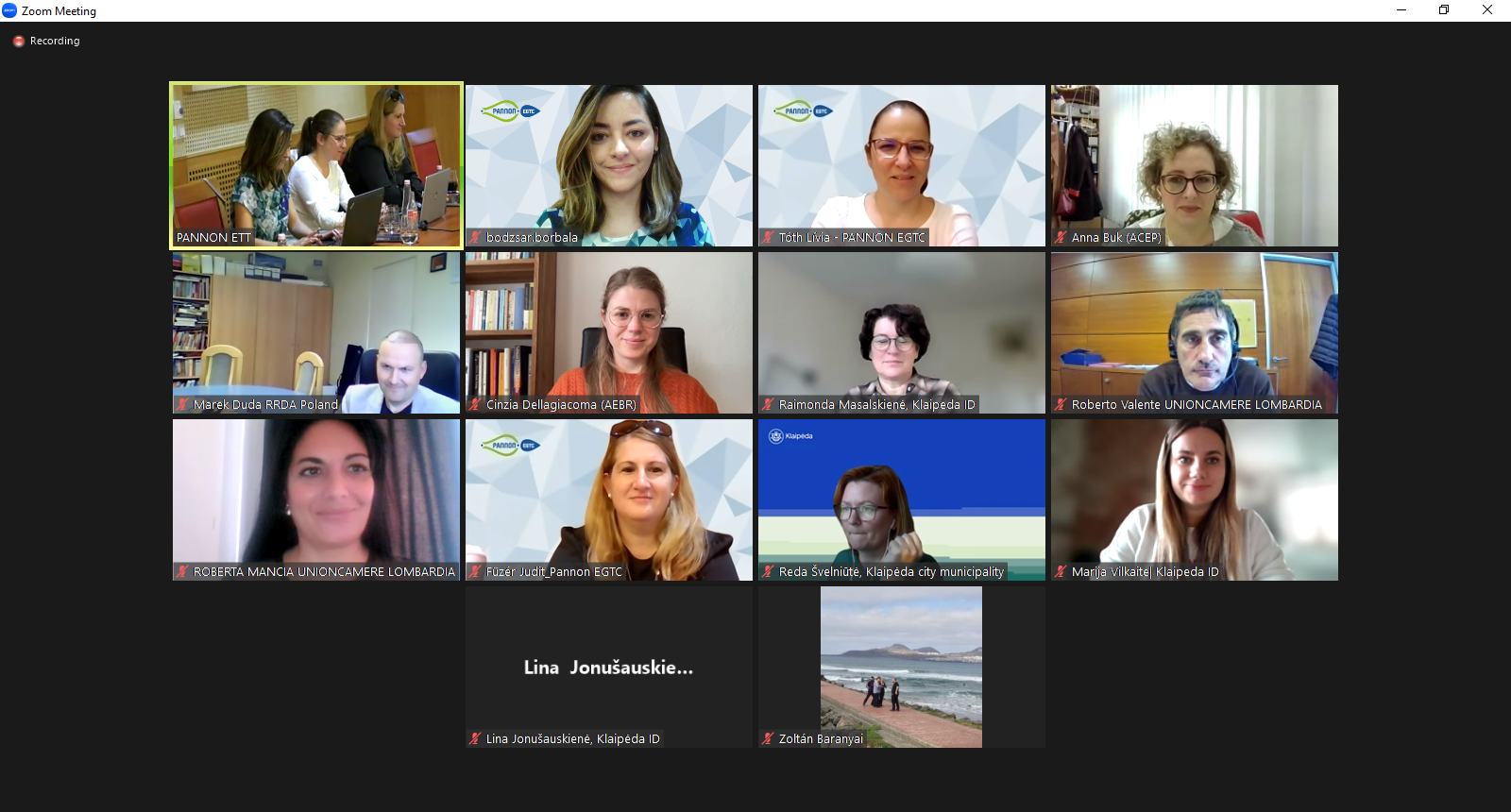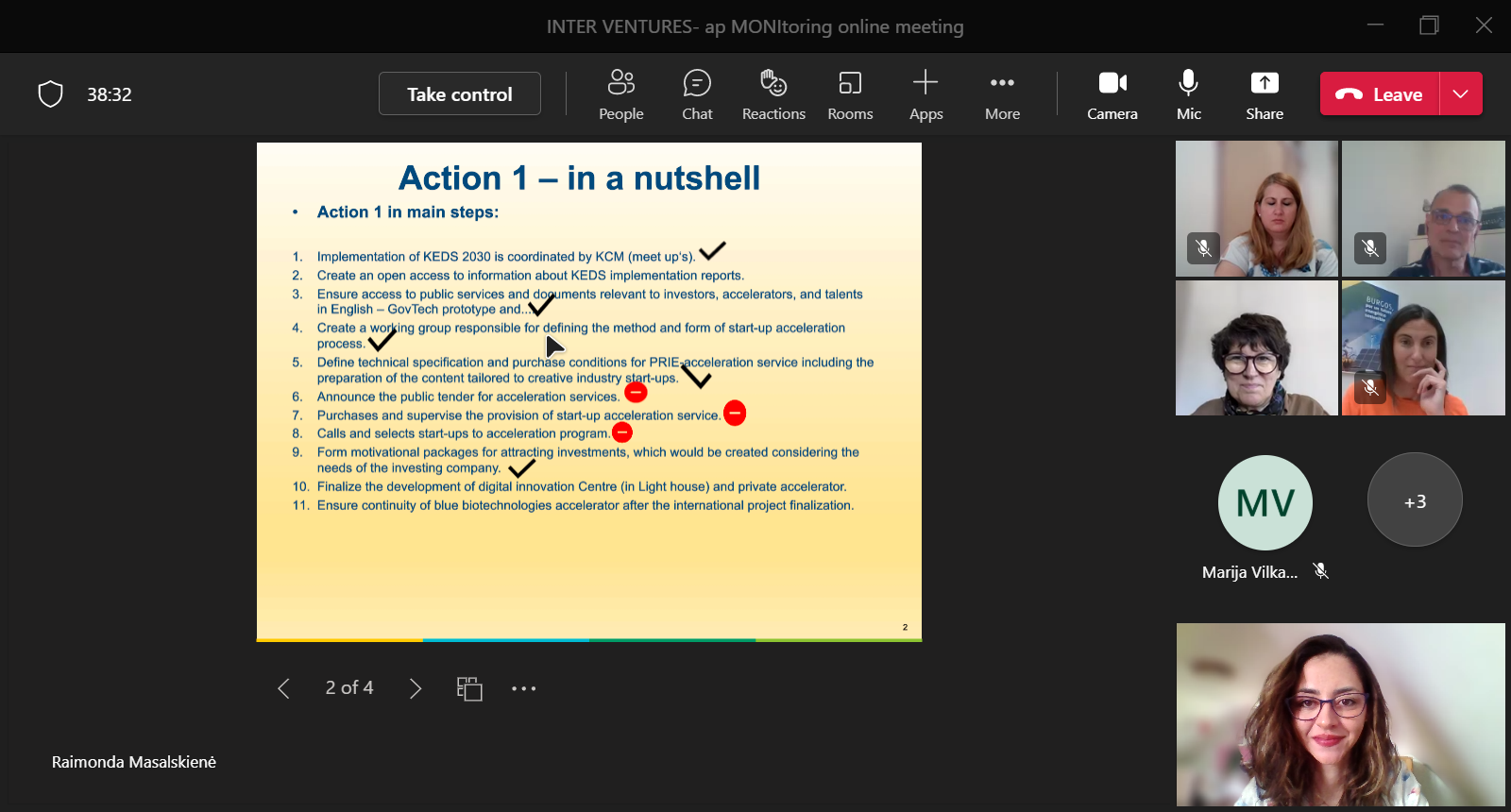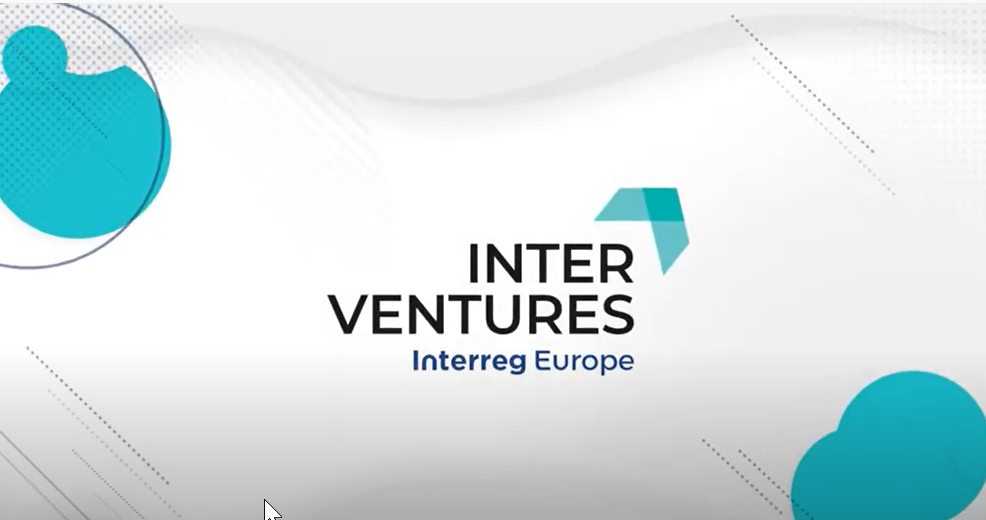
FINAL PARTNER MEETING AND CONFERENCE
The closing event of the project, which was held in Pécs, on November 3, 2022 at 10 a.m. As part of the closing event, it was a conference.
INTER VENTURES promotes the internationalization of SMEs in EU border regions, thus contributing to their growth and increased competitiveness.
INTER VENTURES brings together partners from five European border regions, representing various stages of evolution of SME ecosystems, from occasional cross-border cooperation through more structured networking to international clusterization.
During the project implementation Partners will intensely share their experiences and learn jointly via Thematic Study Visits, Interregional Meetings combining training with discussions. Regional stakeholders will be intensively involved in the process through RSG Meetings and Webinars including training, brainstorm sessions and assisted workshops.
Lessons learnt will be adapted to regional conditions explored through targeted surveys of regional SMEs. As a result, tailor-made regional Action Plans will be elaborated that can lead to the desired improvement of the five selected regional ERDF programmes for the enhanced internationalisation of SMEs.
€1,376,708.00
SME competitiveness
The CBC Programme consists of 4 priority axes (PA) + TA, the total budget is 60,8 M €. Inter Ventures project activities focus on Economic Development - Enhancing the competitiveness of SMEs with 9,9603 M € (16,38%). It has one strategic objective: Fostering value-added business cooperation between SMEs operating on different sides of the border.
The sole supported activity is a special cross-border SME development scheme with overall project development and management support to foster joint product and services development of cooperating SMEs in the programme area.
The scheme aims to improve the weak financial background and networking attitudes of local SMEs. The “Beneficiary Light” Grant Scheme allocates 7,6 M € to SMEs on both sides of the border. The Lead Beneficiary (LB) is the Croatian Agency: HAMAG-BICRO. The scheme was launched as a pilot initiative for direct SME support in the 2014-2020 period. Two calls have been announced so far, however, due to administrative difficulties resulting from the launch of this novel support mechanism, no grant contracts are signed yet. Overall assessment of the scheme’s effectiveness is not yet possible,but it is a warning fact, that the number of SMEs applying has decreased by the 2nd call. Policy improvements are needed to improve the implementation and management of the scheme, and to overcome barriers.
Though the efficiency of the program cannot be evaluated in lack of grant contracts with SMEs the reduced number of project concepts submitted for the 2nd call is indicative of the shrinking attractivity of the Scheme. Improvements are in need regarding largely interlinked aspects of the policy instrument addressed. Shortening procedures so that granted projects can be launched and implemented ASAP.
INTER VENTURES will examine how system-level administrative procedures can be shortened to speed up contracting. Increasing the motivation and trust of the SMEs to participate in the Programme: Missing skills of SMEs, e.g. language competence or the lack/scarcity of experience in foreign markets lower the motivation. Another discouraging factor roots in no available pre-financing for SMEs. INTER VENTURES will examine how overall attractiveness of the B-LIGHT Scheme can be increased.
INTER VENTURES aims to deliver recommendations regarding sectors, SME types, project activities to be supported and review assessment criteria based on outcomes of the interregional learning process. INTER VENTURES will also deliver recommendations for the post-2020 period on the preferred support mechanisms promoting the internationalisation of SMEs.
ERDF ROP provides 970,474,516 € for regional economic growth, social development and fostering productivity. From the 6PAs, the addressed one is PA3 Promote SME competitiveness, with 30.36% of total funding (294,645,000 €). Supporting the strategic objective of ROP to revitalize the Region’s enterprise economy, PA3 aims to maximize SME productivity and to improve SME competitiveness from the start-up stage throughout growth to consolidation by various means.
The project activities are focused on the SO3 Action 3b.1 to increase the level of internationalization of production systems by:
• Supporting export promotion projects, dedicated to SMEs and their aggregated forms on a territorial (including cross-border) or sectoral basis.
• Creating exchange opportunities between Italian and foreign entrepreneurs to attract investments and to promote trade agreements.The main beneficiaries of these actions are SMEs and public bodies.
There is a growing need of SMEs and micro-enterprises to participate in policy dialogue for the implementation of funding schemes tailored to their specific exigencies. This generates a need for improvement in the governance framework behind the OP planning and implementation. The calls are to be improved to provide more distinguished sectoral preferences towards internationalisation measures.
LOMB - representing the interests of the region and the SMEs within - is highly motivated to achieve improvements in the targeted ROP measures. A deeper integration of regional SMEs into international business and innovation flows including the development of cross-border SME ecosystem is a key element of renewing the Region’s economy.The efficiency of the PI measures promoting SME internationalization including cross-border business activity could befurther improved by:
1) Promoting and developing projects to capacitate SMEs in the internationalization of their activities and specificallyencouraging cross-border cooperation in the economic, cultural, mobility, training, and research fields.
2) Treating issues hindering the full use of potentials of SMEs on the Italian-Swiss border identifying factors hampering eco-system building (important for SMEs) and addressing them in the calls related to SO3 Action 3b.1.
3) Elaborating on the monitoring methods to evaluate the impacts of the Lombardy ERDF ROP measures on SME internationalization with special emphasis on the development of border region SME ecosystems. Moreover, by supporting the territorialisation of policies, the PI intends to exploit the implementation of the Alpine Macro-Regional Strategy and the Cross-Border Cooperation Programme Italy-Switzerland.
4) Seeking a more mature governance model for involving the beneficiaries in the policy dialogues for the next programming period.
The objective of the ERDF/ESF Regional OP, with a total budget of 2,48 billion € is to enhance the competitiveness of the Region, and to improve living conditions.
The OP has 9 Priority Axes (PAs) + TA, all fostering key drivers of regional competitiveness: innovation, R&D, technology, SMEs, e-services, energy efficiency, social inclusion.
The expected results is the support of 2,000 SMEs.
RRDA & CARP address PA 1 - Competitive and innovative economy. The fact that Internationalization of SMEs (with a budget of 47 M €) is a key issue is reflected in the supported activities and indicators. Despite these formal OP features, the promotion of cross-border SME cooperation and SME network building is hardly detectable despite the border location of the region. This is also crucial in the light of the fact that PL-SK CBC Programme lacks SME competitiveness priorities. The OP disregards the full potential of SME internationalization for regional SMEs, the issue is not communicated properly and SMEs lack coordinated capacity building activities. Budget is still available for internationalization of SMEs (including cross-border cooperation) therefore the project has true relevance in the (cross-border) region.
In Priority 1. addressing SME competitiveness, more attention is to be given to the internationalization of SMEs especially in cross-border relations. The OP still has reserves for this purpose and further calls for funding are expected in the next few years. The policy improvements concern strategic issues and technical points linked directly to calls. The OP appreciates the importance of internationalization in SME competitiveness but nearly ignores the cross-border potentials. The fact that the Pl-SK CBC Programme has no SME related PA raises the significance of the Regional OP in this regard.
INTER VENTURES project will help to work out proposals to prepare the forthcoming calls to support interventions more targeted to fostering the SMEs business environment in the border region and SME export-oriented investments. INTER VENTURES will also answer how to generate a more intense communication of the calls related to SME internationalization in the border area of Podkarpackie Region. The project seeks the ways to expand the scope of supported activities covering cross-border clusterization and more systematic network building towards EU (Slovakia) and non-EU (Ukraine) border sections.Based on INTER VENTURES impulses RRDA & CARP (regional and CBC entities) will be able to prepare for the next programming period in a synchronized way.
The Burgos Strategic Plan 2015-2020 (PEBUR 1520) is the main planning document for the Province of Burgos, encouraging economic activity, enhancing quality of life, valorising human capital and boosting territorial image.
PEBUR has 5 Strategic Lines: 1) Economic, 2) Connectivity, 3) Quality of Life, 4) Human Capital, 5) Image and Tourism and 2 Horizontal Lines of Competitiveness: Participatory Management and Territorial Sustainability.
In InterVentures Project responsible partners will focus on the “Economic” Strategic Line, Development of the Bio-economy 5.4. Promoting innovation, transformational and commercialisation activity and greater INTERNATIONALISATION not only in the bioeconomy but also, e.g., in agri-food, forestry or auto parts in which the province has marked competitive advantage.
Based on the program monitoring results the SMEs’ export performance proved to be below expectations and potentials, which might be due to that LINE 1) ECONOMY treated SME internationalization as marginal.
To achieve a better performance of SMEs on international markets and in cross-border relations PEBUR is to be improved via the InterVentures action plan, i.e:
1) RECONSIDERING THE STRATEGIC FOCUS to make it expanded, integrated, coordinated, sustainable, developing specific annual action plans for SME internationalisation in all dimensions.
2) Generating and/or adapting NEW MEASURES based on good practice-based methodologies and programmes designed for international and cross-border cooperation for SMEs in general.
3) GENERATING INITIATIVES AND TOOLS (actions and projects).
4) Improving MONITORING METHODS for the programme in terms of efficacy of the internationalisation interventions in general and in cross-border relations in particular.
KEDS (2018-2030) was prepared to activate potentials to attract investments & talent to the main port city of LT by promoting eco-system building and merging in international flows. The strategy and action plan was initiated by Klaipėda City Municipality & 5 partners.
KEDS vision - Klaipėda becomes a world class blue economy city: the best place to live, work, rest and invest in the Baltic region.
Interventure objectives are relevant in the following of the 7 main objectives and actions:
1.3.1 To develop a friendly ecosystem by getting SMEs join international value chains;
1.4.1 To increase the capacities of local SMEs to expand their exports;
3.4.3 To increase regional and internat. cooperation by getting SMEs involved ininternat. strategic projects in the Baltic & wider region;
5.1.2 To develop cross-sectoral cooperation of bio-economy companies by promoting the participation of local companies in internat. partnerships in Scand. & Germany.
KEDS is up to date while having points to be improved to maximize impact on SME internationalization:
• the objective related to SME internationalization is not highlighted enough in the strategy;
• the strategy is scarce in initiatives to enhance SME internationalization,
• monitoring of international activities of SMEs is haphazard, not regular thus a system for regular monitoring of SME internationalization cannot be followed and evaluated systematically.
Internationalization is of high relevance in West of Lithuania offering prospects for SMEs to join regional projects (e.g. in marine industries, bio-economy, blue-economy) and to reach new markets due to the port of Klaipėda and Klaipėda county bordering Latvia, and Russia (Kaliningrad) and Poland.
The following improvements are envisaged in the PI:
• Structural amendment in the strategy which raises the SME internationalization on the level of objectives / sub-objectives to highlight more the role of SMEs in the local economic eco-system and to enhance even more the potentials of internationalization in the port city of Klaipėda as a business opportunity for all.
• A sound monitoring system is to be worked out in the InterVentures AP, which is to be made part of the Strategy monitoring scheme. The aim is to generate more reliable data on the development of the international SME initiatives and business transactions. This data pool would serve continuous evaluation of trends thus would keep the city and other stakeholders informed to take further actions if needed.
• Developing a supportive system for the SMEs (mentoring, training) in the strategy as an action to enhance their preparedness for deeper integration into international flows.

The closing event of the project, which was held in Pécs, on November 3, 2022 at 10 a.m. As part of the closing event, it was a conference.

The closing event of the project, which will be held in Pécs, at the Kodály Center (7622 Pécs, Breuer Marcell sétány 4.) on November 3, 2022, starting at 10 a.m

The date has been set
INTERVENTURES project will hold its last partner meeting and final event on 3, November in Pécs, Hungary (hybrid meeting foreseen).

Society for the development of Burgos and European Business and Innovation Centre participate as partners in the Interreg Europe project INTER VENTURES.

This year In February, the project entered the second phase of implementation.

Inter Ventures' first phase was delivered, and now project partners are concentrating on a second one which will end on the 31st of January 2023.

INTERVENTURES stepped into the second phase of its implementation.

On February 15 project partners had the first Phase 2 kick-off meeting.

Inter Ventures is an interregional cooperation project funded by the Interreg Europe Programme for improving Small and Medium Enterprises (SME) competitiveness

We are excited to share our final project video about Inter Ventures Action Plan- https://www.youtube.com/watch?v=E3RboEzj9sA